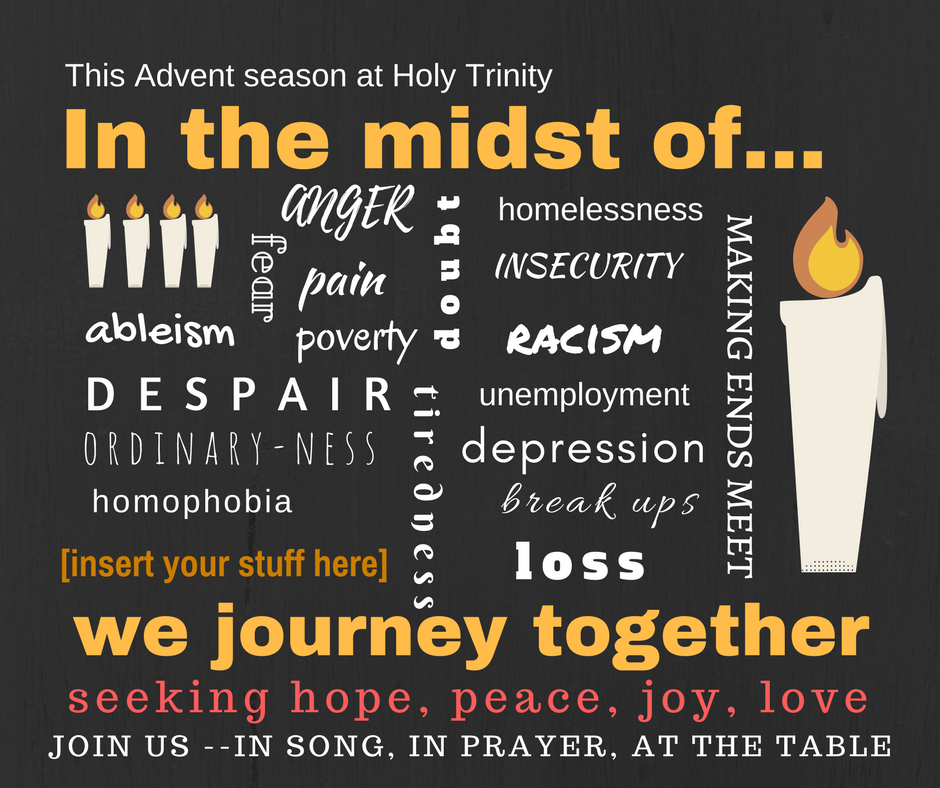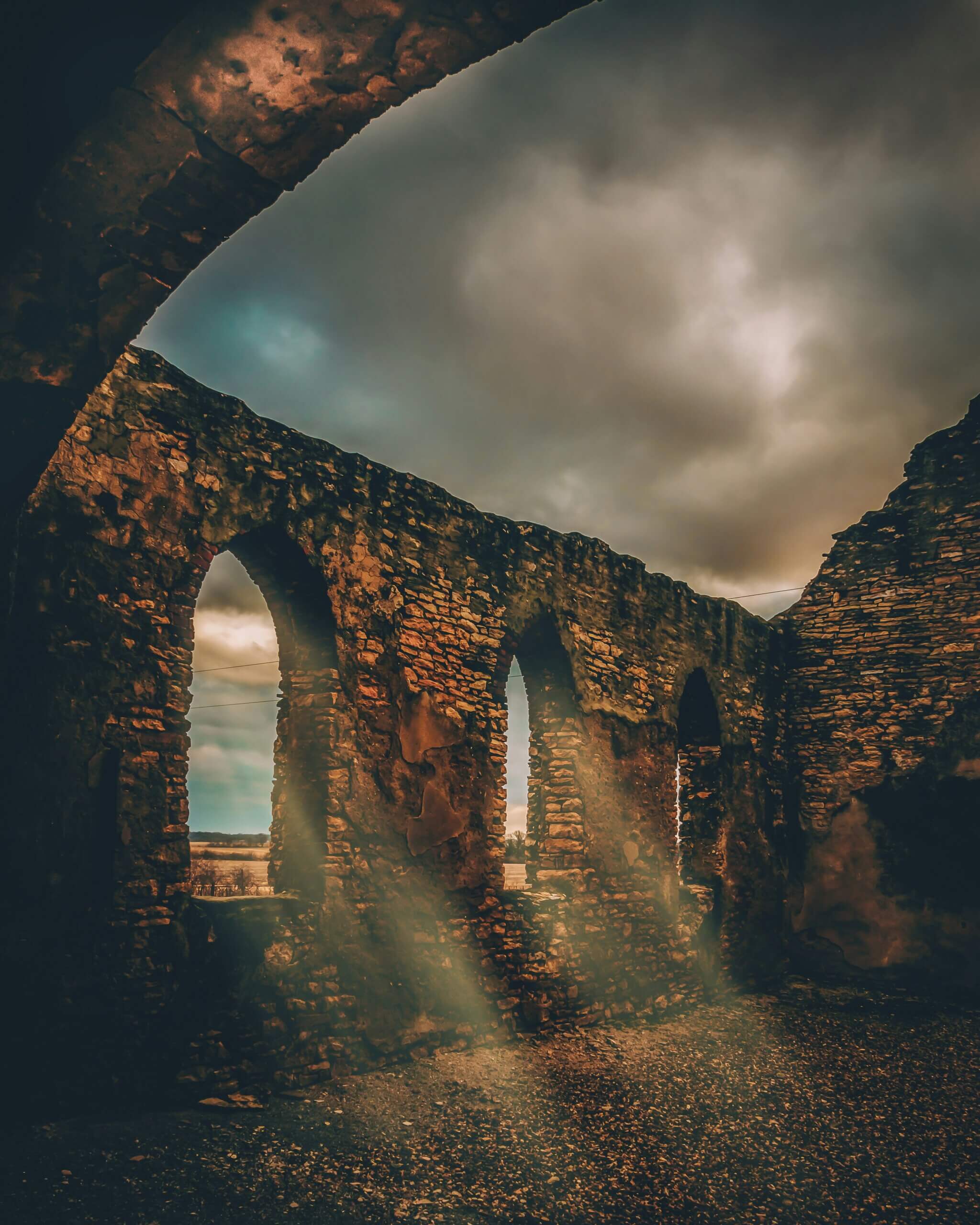Isaiah 64:1-9
Mark 13:24-37
Some of you may be a bit leery of an Advent homily entitled “Anger as Fuel for Hope.” Isn’t ‘anger’ one of the seven deadly sins, I hear you ask? Isn’t Advent the rehearsal for the angelic choirs singing about peace on earth, and the arrival of the Prince of Peace. Why buzz kill the season’s hopeful mood? Why, indeed?
Well, for one reason, today’s scripture readings are reminders of the pain and suffering that humans have inflicted upon one another since forever, and testimonials to an understanding or acknowledgement that it will take a wisdom greater than our own to set things right, perhaps even a transcendent wisdom. “O that you would tear open the heavens and come down!” the prophet Isaiah cries out. The story of Christmas has become so romanticized, its rough edges filed down, its scandalous message tied with a bow, the rough places steam-rolled, that it could be the work product of Walt Disney.
The kind of anger that qualifies as one of the seven deadly sins is the ungovernable rage that destroys without caring about consequences. Not the righteous indignation that motivates Jesus’ cleansing of the Temple. Anger, and its cousin, hatred, are dominant themes through our sacred writings. The story of Cain and Abel is a story of letting resentment turn into anger and hatred to the point of murder. Prior to the Exodus, God’s anger at the injustice of the Hebrew slaves under the Egyptian Pharaoh motivates the call to Moses and Aaron to initiate the action that started a very long story in motion. Amos, Isaiah, Jeremiah, and the other prophets rendered angry judgments against the perpetrators of injustice and the systems that supported them in their own time. I think it is fair to say that their righteous anger prevented them from pulling punches or giving up. When people give up, hope dies. Focussed anger is one of the things that can keep hope alive. We have been watching this dynamic play out daily in the media, as one powerful man after another has been called to account for abuse of power over others for their own gratification. Is there anything more offensive than someone declaring there is nothing that can be done to change the system?
I remember when John Paul II was pope, the question of the ordination of women kept coming up. Finally, one day, I remember reading that John Paul had had enough, and announced that there would be no more conversation about the ordination of women—ever. Period. Full stop. I also remember my next thought was: Wanna make a bet? At the 1998 Lambeth Conference, the every-ten-year gathering of Anglican bishops around the world, conservative bishops succeeded in passing a resolution that included “rejecting homosexual practice as incompatible with Scripture.” When someone from one of the LGBT advocacy organizations questioned one of the functionaries in the Archbishop of Canterbury’s office about it, the response was essentially, “You lost. Get over it.” But we didn’t get over it. And, in 20 years—yes, it has taken 20 more years—but I performed my first same-sex wedding in this space last summer.
God is not done with us yet. We continue to be under development, as individuals and as a community. As Isaiah put it: “We are the clay and you are our potter; we are all the work of your hand.” We are affected by forces in the world around us and we are guided by our values and beliefs. Like Moses and Ezekiel, and Jesus and Paul, we live in a world where many players are invested in destabilizing empires to prop up their own regimes and prestige. Meanwhile 65 million people have been displaced from their homelands, according to Ai Wei Wei’s film, Human Flow.
Susie Henderson, who is on the Advent planning team, created a graphic to wrap our arms around the complexity of our journey this Advent. It is on the cover of the bulletin and on our wind signs outside:

If your anger about poverty or homelessness or sexual harassment prompts you to sent an email, write a letter to the editor, make a phone call, join with a group of others who are also impatient about persistent injustice, or write a book, or organize a conference, then you are living into God invitation to bring the reign of God to earth, to incarnate, to make real, to bring to life the values at the heart of the message that got Jesus nailed to a cross. Herod tried to silence him as a baby, and that failed, too. There are powerful interests for whom peace on earth would hurt their bottom line. Corporate interests would be perfectly content to create a new generation of economic slaves. So let your anger fuel your hope that our efforts are not in vain, no matter how long it takes. Generations yet unborn MAY be grateful, even if they don’t have a name to remember.
In the midst of everything we are dealing with, we journey together, seeking hope, peace, joy, and love. Journey with us all the way to Bethlehem.






